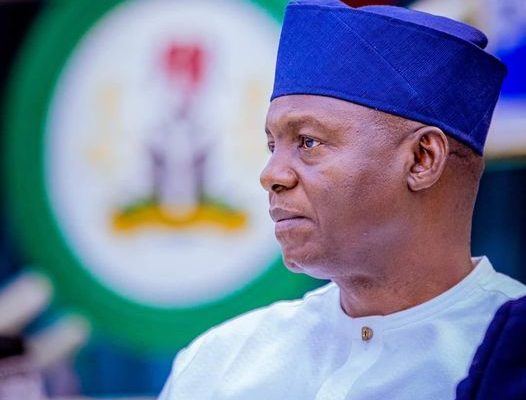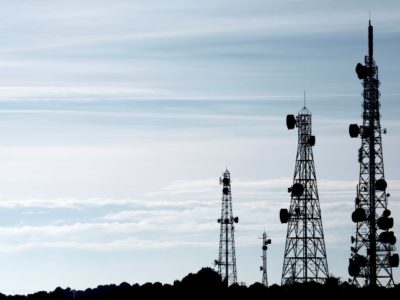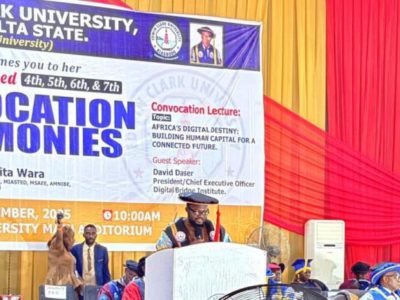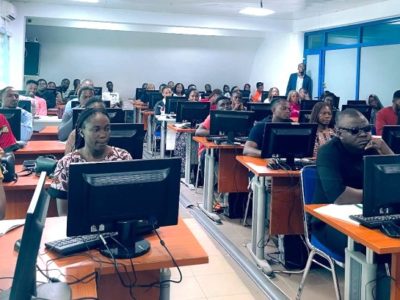Matters eRising with Olusegun Oruame
“By strategically leveraging data, digital technology, and collaborative partnerships, Nentawe Yilwatda has the opportunity to steer the country toward significant economic empowerment for over 100 million Nigerians.”
Prof Nentawe Goshwe Yilwatda has been appointed as the new Minister of Humanitarian Affairs and Poverty Reduction by President Bola Tinubu, following the dismissal of Dr. Betta Edu. In a nation with nearly 110 million people living in extreme poverty, his task goes beyond any other ministerial portfolio, impacting over 70% of Nigeria’s population. In a ministry long associated with corruption and inefficiency, Yilwatda’s mandate is crucial for the success of Tinubu’s Renewed Hope Agenda. His primacy constituency is the ‘Wretched of Nigeria’s Earth” to paraphrase Frantz Fanon‘s book of that title.
RELATED: Nentawe Yilwatda, new Humanitarian Affairs Minister, among Nigeria’s 50 Most Influential Digital Economy Leaders
Understanding Nigeria’s Deep Poverty Crisis
Nigeria has become the world’s poverty capital, with an estimated 88.4 million people living in extreme poverty as at 2022. The poverty rate increased to 46% by 2023, with 104 million people now struggling on less than $1.90 per day. The World Bank projects that poverty will continue to rise, potentially affecting 93.7 million Nigerians by 2025. Contributing factors include low consumer spending, inflation, and stagnant wages, even amidst seemingly low unemployment rates. The Bank’s development update for 2023: ‘Turning the Corner: From Reforms & Renewed Hope, to Results’, paints a scary scenario. This is the space where Nentawe is expected to deplore people, procedure, technology to manage a sustainable framework that will achieve ministry’s mandate for the first time since it was created.
As projected for 2024 by the likes of Statista and PWC, poverty levels have increased in multiple dimensions. This is underpinned by Nigeria’s low unemployment rate, low consumer spending and purchasing power even as inflation continues aggressively and harshly.
The Minister’s Task: Reforming a Troubled Ministry
The Ministry of Humanitarian Affairs has a history of mismanagement, corruption, and failure to alleviate poverty. Previous programs have been undermined by factors such as weak governance, lack of data-driven policies, minimal technology integration, policy inconsistency, and inadequate infrastructure. Others include inadequate stake-holding by beneficiaries and operators, ineffective leadership, inefficient integration of states and local governments, among several others. Social protection policy responses to poverty in Nigeria by the ministry has been nil. Yilwatda must tackle these challenges head-on to bring the Renewed Hope Agenda to life and genuinely lift millions out of poverty.
His background as a technology expert and former lecturer, coupled with his experience in political campaigns using digital tools, positions him well for this mission. Yilwatda has previously spoken about the importance of collaboration and leveraging technology for sustainable growth—a philosophy he now needs to implement on a national scale.
Earlier in March at the IT Edge News.Africa forum in Lagos, Yilwatda had delivered a keynote on “Building Synergy Across Sectors and Stakeholders to Create Opportunities for Young People in Nigeria’s Digital Economy.” He emphasised that fostering collaboration is essential for sustainable growth. Collaboration and innovation are essential to ensure that Nigeria’s digital transformation positively impacts society and reduces poverty, said Yilwatda. In his new mission, Yilwatda must walk his talk to mobilise technologies and collaborations to reduce poverty for millions of Nigerians.
Data-Driven Policies: The Foundation for Effective Poverty Reduction
It’s time to dissect poverty in its many dimensions and view those affected as key data points, not just statistics. The outdated approach of treating poverty solely as a cash-dependent issue needs to end. Given his track record, I believe the new minister is poised to adopt a more strategic and data-driven approach to tackle poverty at its roots. He will deploy the steps below and many more.
Comprehensive Poverty Assessment
How much has data been used to guide decision-making in the ministry? Unfortunately, many past initiatives have relied on arbitrary approaches. For example, previous programs like ‘tradersmoni’ simply distributed cash to traders without a strategic framework, turning markets into cash handout hubs and leaving room for corruption. The new minister, known as ‘Data Boy’ in Plateau State, earned his reputation by driving his campaign with a focus on real data and demographics, particularly targeting young, upwardly mobile voters, achieving impressive results. He is expected to bring this data-centric mindset to the ministry, leveraging insights from the National Bureau of Statistics and global organizations like the World Bank to pinpoint poverty hotspots and identify root causes.
Using data to address Nigeria Multidimensional Poverty Index
The minister will likely engage numerous local hubs across Nigeria to gather accurate, grassroots-level data to support targeted interventions in key areas such as unemployment, education, and infrastructure. Additionally, this approach will enable the ministry to address the findings of the 2022 Nigeria Multidimensional Poverty Index (MPI), which highlights 15 indicators across four dimensions—health, education, living standards, and work and shocks—that collectively impact over 110 million Nigerians living in poverty.
Setting Goals with Measurable Data
- Geospatial Mapping of Poverty Hotspots
By employing geospatial data, the ministry can allocate resources more effectively to areas most in need. - Set Measurable Goals
Now is the time to establish clear targets such as reducing poverty by a set percentage within specific timeframes, with data used to track progress.
Harnessing Digital Technology for Social Protection
- Digitize Welfare Programs
It is time to bring digital wallets to people in poverty. A digital social registry can track welfare beneficiaries and reduce fraud. On the other hand, e-wallets can facilitate direct cash transfers to impoverished households. - Expand Digital Identification
Working with the National Identity Management Commission, the ministry can rework how it identify its targeted constituency. With the NIMC, it can provide digital IDs for all Nigerians that will streamline service delivery.
Building Skills and Jobs in the Digital Economy
- Digital Skills Training
Collaborate with agencies to equip young Nigerians with skills like coding, graphic design, and data analysis, reducing youth unemployment. - Support Digital Entrepreneurship
Provide funding and mentorship for startups solving local challenges, stimulating job creation and economic growth.
Leveraging Technology to Boost Agricultural Productivity
- Promote Precision Agriculture
Work with agencies like the National Information Technology Development Agency (NITDA). Encourage the adoption of digital tools like drones and data analytics to improve crop yields and farmers’ incomes. - Digital Market Platforms
Online platforms can connect farmers directly with consumers, increasing their profits by cutting out intermediaries.
Expanding Digital Infrastructure in Underserved Areas
- Broaden Broadband Access
Collaborate with relevant ministries and agencies like the Nigerian Communication Commission to extend internet access to rural areas, promoting e-learning, e-commerce, and remote work. - Community Digital Hubs
Work with local government councils to establish digital centers offering internet access, skills training, and government services in rural regions.
Strengthening Social Safety Nets with Real-Time Data
- Data Analytics in Program Monitoring
Use data to assess the impact of social programs, making real-time adjustments to enhance outcomes. - Early Warning Systems
Implement digital tools to detect food insecurity or economic shocks, allowing for timely interventions.
Driving Financial Inclusion Through Fintech
- Promote Mobile Banking
Partner with the Central Bank of Nigeria and fintech companies to provide mobile banking in underserved areas, making financial services accessible to more people. - Financial Literacy Campaigns
Educate Nigerians on digital banking and money management to empower them financially.
Improving Education and Health Outcomes with Data
- Expand E-Learning Platforms
Create online learning resources accessible via mobile devices, targeting regions with weak school infrastructure. - Leverage Mobile Health Solutions
Use digital tools to deliver health services and track disease outbreaks in remote areas.
Collaborative Approaches to Scaling Poverty Alleviation
- Engage the Private Sector
Encourage corporate investment in social initiatives like digital education and healthcare. It is time to go for the low hanging fruits from CSR to support the underprivilege in a targeted way. Government alone cannot fund uplifting those below the poverty threshold. - Partner with International Development Agencies
Leverage global expertise and funding to scale poverty reduction efforts.
Tracking Progress and Adapting for Long-Term Success
This is the time to completely digitise every operation of the ministry and track policy impacts on vulnerable Nigerians.
- Update Poverty Dashboards Regularly
Use dashboards to monitor indicators such as income and access to services, ensuring transparency. - Incorporate Feedback
Use surveys and community consultations to improve programs based on beneficiary experiences.





























